MN3041QA - Development for Success in Business: Learning Style Report
VerifiedAdded on 2023/01/06
|7
|1148
|89
Report
AI Summary
This report analyzes the student's learning style based on the Honey & Mumford theory, including an introduction detailing past educational experiences, goals, and attendance. It explores different learning styles like Activist, Theorist, Reflector, and Pragmatist, along with types of class attendees. The self-analysis section identifies the student's preferred learning style, supported by the theory. The report concludes with a summary of the learning styles, emphasizing the importance of self-awareness and the application of different learning strategies to improve skills and knowledge. Reference section includes books, journals and online sources used in the report.
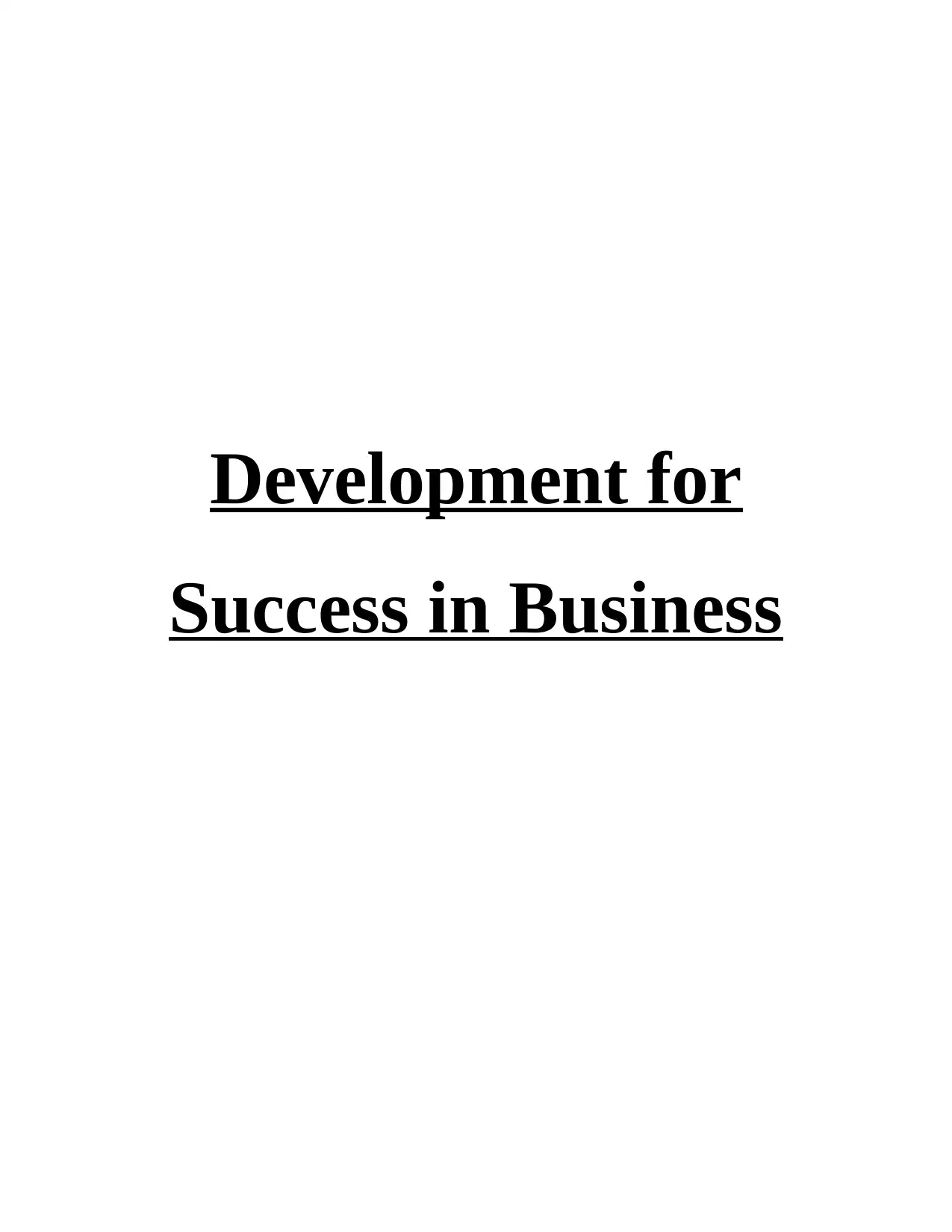
Development for
Success in Business
Success in Business
Paraphrase This Document
Need a fresh take? Get an instant paraphrase of this document with our AI Paraphraser
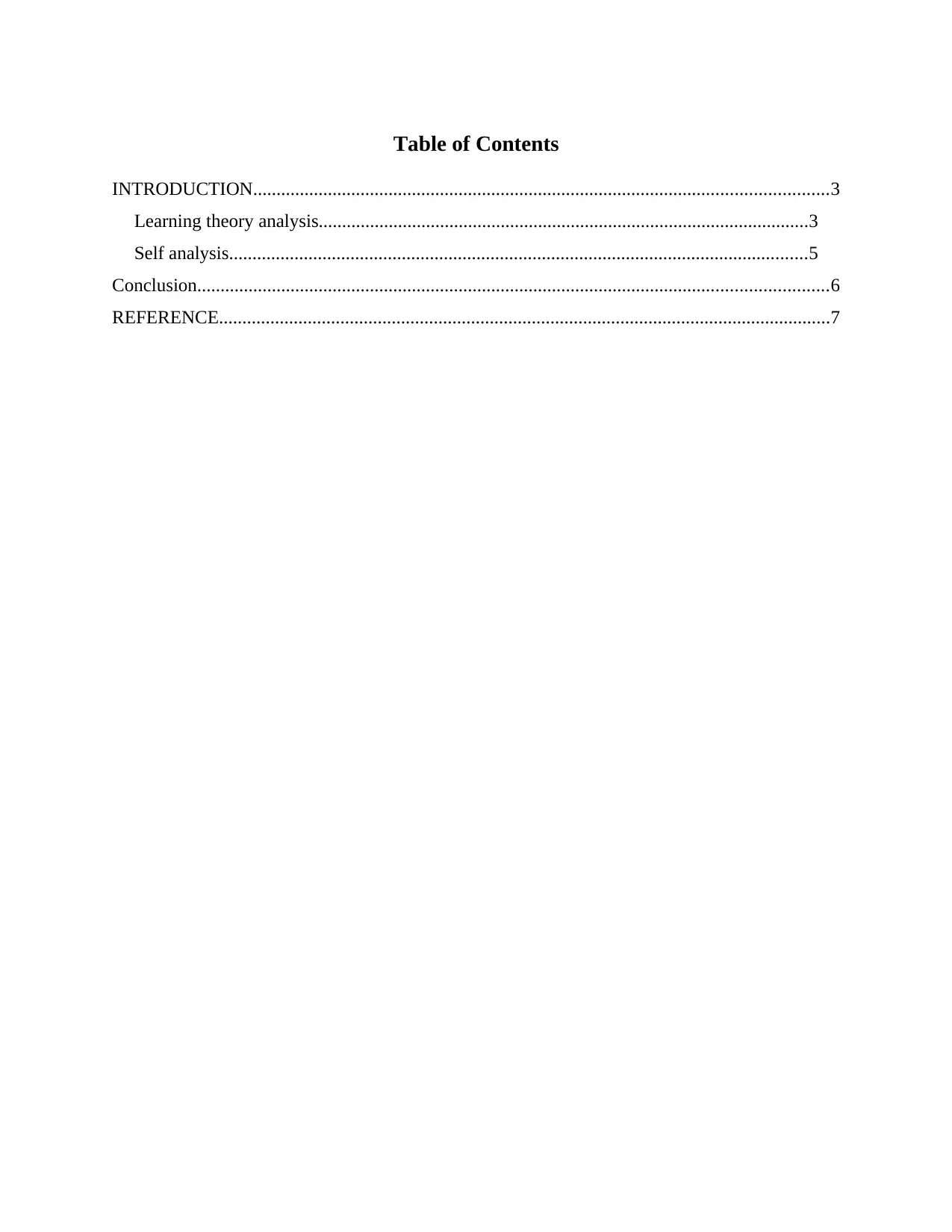
Table of Contents
INTRODUCTION...........................................................................................................................3
Learning theory analysis.........................................................................................................3
Self analysis............................................................................................................................5
Conclusion.......................................................................................................................................6
REFERENCE...................................................................................................................................7
INTRODUCTION...........................................................................................................................3
Learning theory analysis.........................................................................................................3
Self analysis............................................................................................................................5
Conclusion.......................................................................................................................................6
REFERENCE...................................................................................................................................7
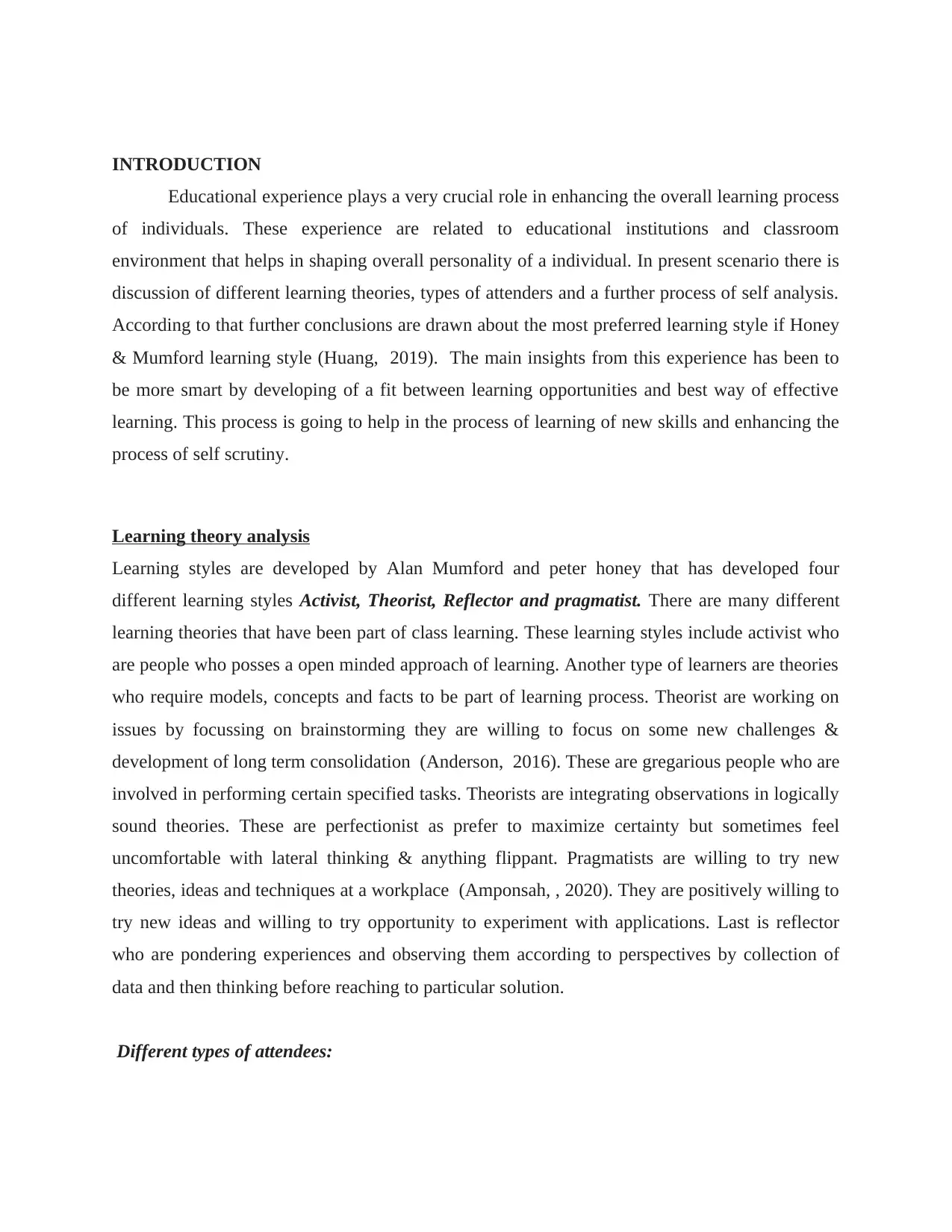
INTRODUCTION
Educational experience plays a very crucial role in enhancing the overall learning process
of individuals. These experience are related to educational institutions and classroom
environment that helps in shaping overall personality of a individual. In present scenario there is
discussion of different learning theories, types of attenders and a further process of self analysis.
According to that further conclusions are drawn about the most preferred learning style if Honey
& Mumford learning style (Huang, 2019). The main insights from this experience has been to
be more smart by developing of a fit between learning opportunities and best way of effective
learning. This process is going to help in the process of learning of new skills and enhancing the
process of self scrutiny.
Learning theory analysis
Learning styles are developed by Alan Mumford and peter honey that has developed four
different learning styles Activist, Theorist, Reflector and pragmatist. There are many different
learning theories that have been part of class learning. These learning styles include activist who
are people who posses a open minded approach of learning. Another type of learners are theories
who require models, concepts and facts to be part of learning process. Theorist are working on
issues by focussing on brainstorming they are willing to focus on some new challenges &
development of long term consolidation (Anderson, 2016). These are gregarious people who are
involved in performing certain specified tasks. Theorists are integrating observations in logically
sound theories. These are perfectionist as prefer to maximize certainty but sometimes feel
uncomfortable with lateral thinking & anything flippant. Pragmatists are willing to try new
theories, ideas and techniques at a workplace (Amponsah, , 2020). They are positively willing to
try new ideas and willing to try opportunity to experiment with applications. Last is reflector
who are pondering experiences and observing them according to perspectives by collection of
data and then thinking before reaching to particular solution.
Different types of attendees:
Educational experience plays a very crucial role in enhancing the overall learning process
of individuals. These experience are related to educational institutions and classroom
environment that helps in shaping overall personality of a individual. In present scenario there is
discussion of different learning theories, types of attenders and a further process of self analysis.
According to that further conclusions are drawn about the most preferred learning style if Honey
& Mumford learning style (Huang, 2019). The main insights from this experience has been to
be more smart by developing of a fit between learning opportunities and best way of effective
learning. This process is going to help in the process of learning of new skills and enhancing the
process of self scrutiny.
Learning theory analysis
Learning styles are developed by Alan Mumford and peter honey that has developed four
different learning styles Activist, Theorist, Reflector and pragmatist. There are many different
learning theories that have been part of class learning. These learning styles include activist who
are people who posses a open minded approach of learning. Another type of learners are theories
who require models, concepts and facts to be part of learning process. Theorist are working on
issues by focussing on brainstorming they are willing to focus on some new challenges &
development of long term consolidation (Anderson, 2016). These are gregarious people who are
involved in performing certain specified tasks. Theorists are integrating observations in logically
sound theories. These are perfectionist as prefer to maximize certainty but sometimes feel
uncomfortable with lateral thinking & anything flippant. Pragmatists are willing to try new
theories, ideas and techniques at a workplace (Amponsah, , 2020). They are positively willing to
try new ideas and willing to try opportunity to experiment with applications. Last is reflector
who are pondering experiences and observing them according to perspectives by collection of
data and then thinking before reaching to particular solution.
Different types of attendees:
⊘ This is a preview!⊘
Do you want full access?
Subscribe today to unlock all pages.

Trusted by 1+ million students worldwide
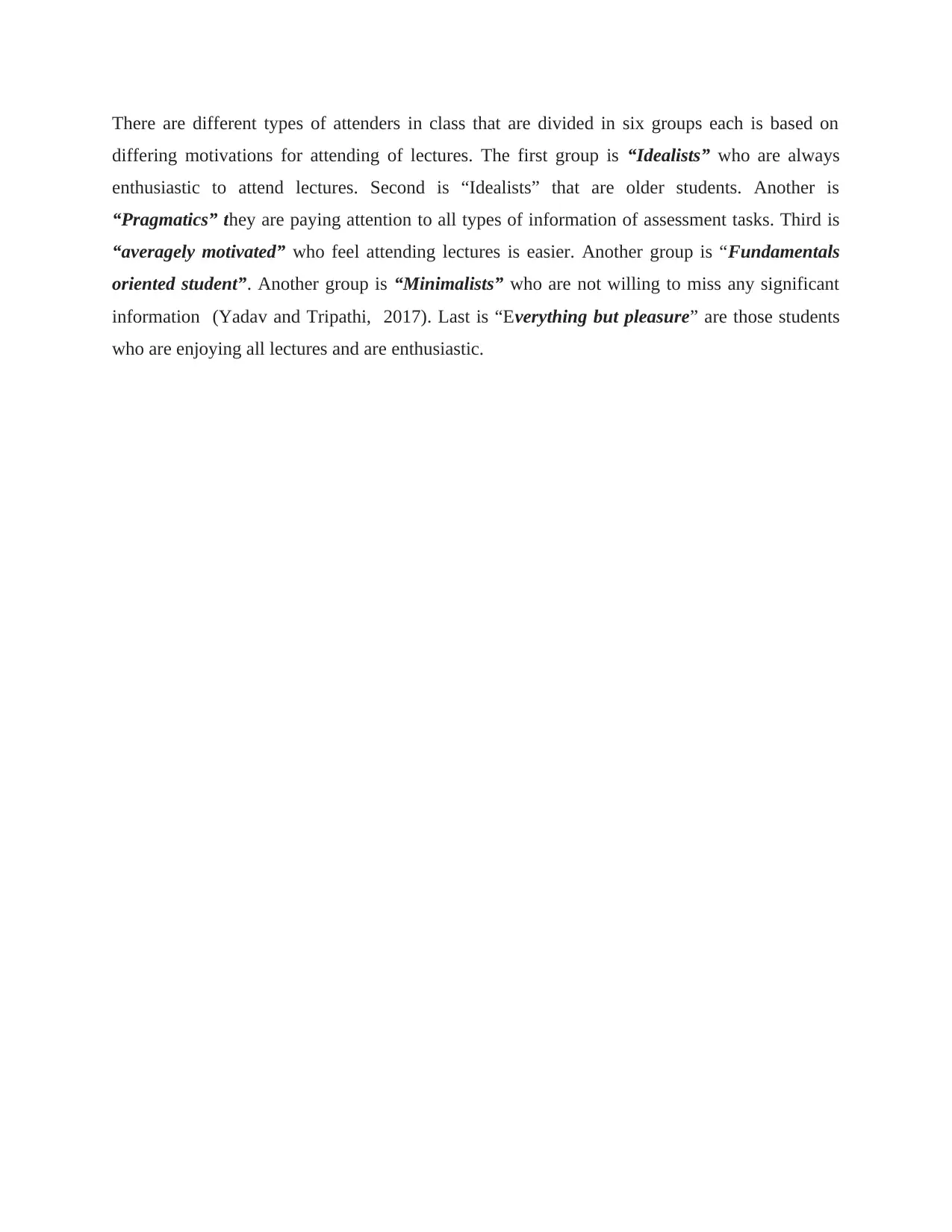
There are different types of attenders in class that are divided in six groups each is based on
differing motivations for attending of lectures. The first group is “Idealists” who are always
enthusiastic to attend lectures. Second is “Idealists” that are older students. Another is
“Pragmatics” they are paying attention to all types of information of assessment tasks. Third is
“averagely motivated” who feel attending lectures is easier. Another group is “Fundamentals
oriented student”. Another group is “Minimalists” who are not willing to miss any significant
information (Yadav and Tripathi, 2017). Last is “Everything but pleasure” are those students
who are enjoying all lectures and are enthusiastic.
differing motivations for attending of lectures. The first group is “Idealists” who are always
enthusiastic to attend lectures. Second is “Idealists” that are older students. Another is
“Pragmatics” they are paying attention to all types of information of assessment tasks. Third is
“averagely motivated” who feel attending lectures is easier. Another group is “Fundamentals
oriented student”. Another group is “Minimalists” who are not willing to miss any significant
information (Yadav and Tripathi, 2017). Last is “Everything but pleasure” are those students
who are enjoying all lectures and are enthusiastic.
Paraphrase This Document
Need a fresh take? Get an instant paraphrase of this document with our AI Paraphraser
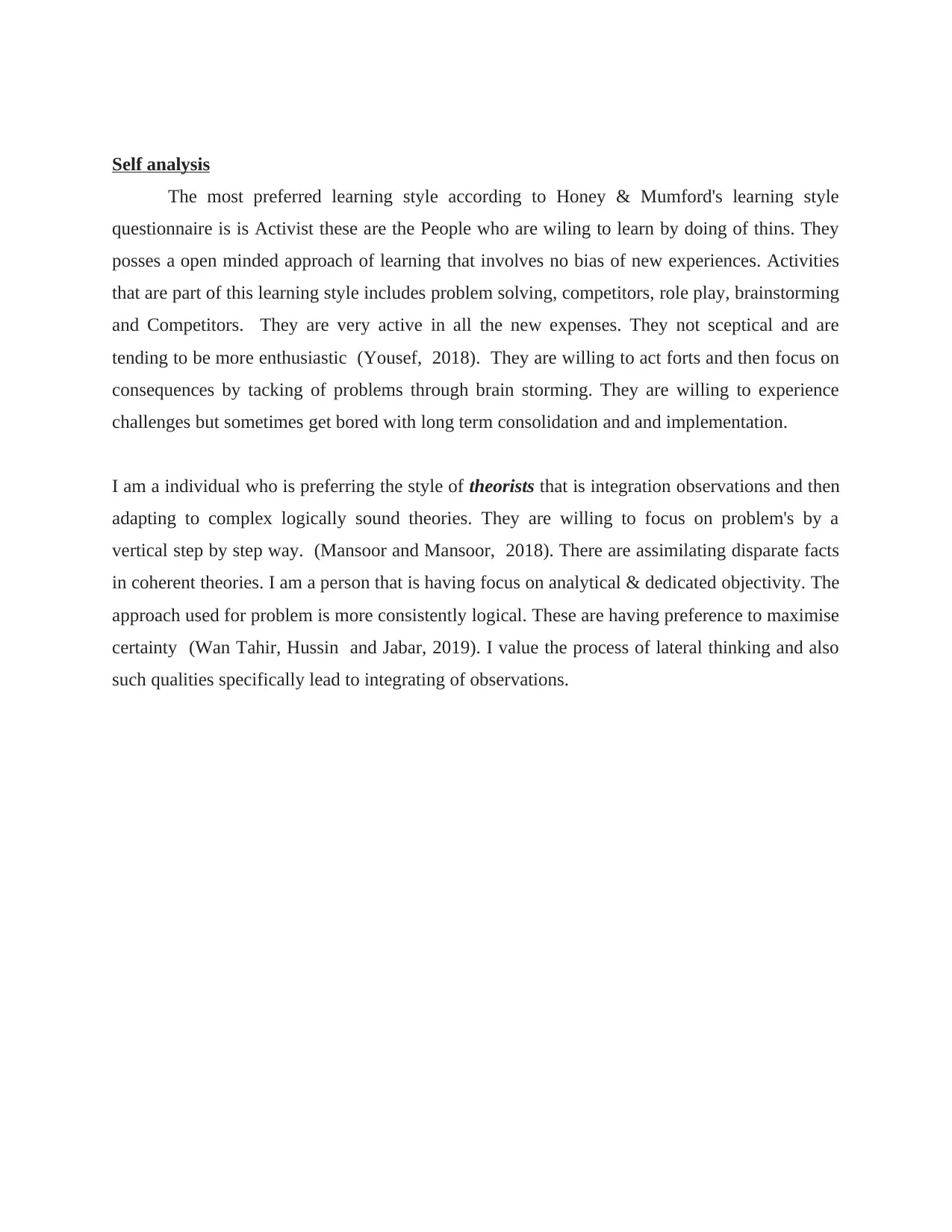
Self analysis
The most preferred learning style according to Honey & Mumford's learning style
questionnaire is is Activist these are the People who are wiling to learn by doing of thins. They
posses a open minded approach of learning that involves no bias of new experiences. Activities
that are part of this learning style includes problem solving, competitors, role play, brainstorming
and Competitors. They are very active in all the new expenses. They not sceptical and are
tending to be more enthusiastic (Yousef, 2018). They are willing to act forts and then focus on
consequences by tacking of problems through brain storming. They are willing to experience
challenges but sometimes get bored with long term consolidation and and implementation.
I am a individual who is preferring the style of theorists that is integration observations and then
adapting to complex logically sound theories. They are willing to focus on problem's by a
vertical step by step way. (Mansoor and Mansoor, 2018). There are assimilating disparate facts
in coherent theories. I am a person that is having focus on analytical & dedicated objectivity. The
approach used for problem is more consistently logical. These are having preference to maximise
certainty (Wan Tahir, Hussin and Jabar, 2019). I value the process of lateral thinking and also
such qualities specifically lead to integrating of observations.
The most preferred learning style according to Honey & Mumford's learning style
questionnaire is is Activist these are the People who are wiling to learn by doing of thins. They
posses a open minded approach of learning that involves no bias of new experiences. Activities
that are part of this learning style includes problem solving, competitors, role play, brainstorming
and Competitors. They are very active in all the new expenses. They not sceptical and are
tending to be more enthusiastic (Yousef, 2018). They are willing to act forts and then focus on
consequences by tacking of problems through brain storming. They are willing to experience
challenges but sometimes get bored with long term consolidation and and implementation.
I am a individual who is preferring the style of theorists that is integration observations and then
adapting to complex logically sound theories. They are willing to focus on problem's by a
vertical step by step way. (Mansoor and Mansoor, 2018). There are assimilating disparate facts
in coherent theories. I am a person that is having focus on analytical & dedicated objectivity. The
approach used for problem is more consistently logical. These are having preference to maximise
certainty (Wan Tahir, Hussin and Jabar, 2019). I value the process of lateral thinking and also
such qualities specifically lead to integrating of observations.
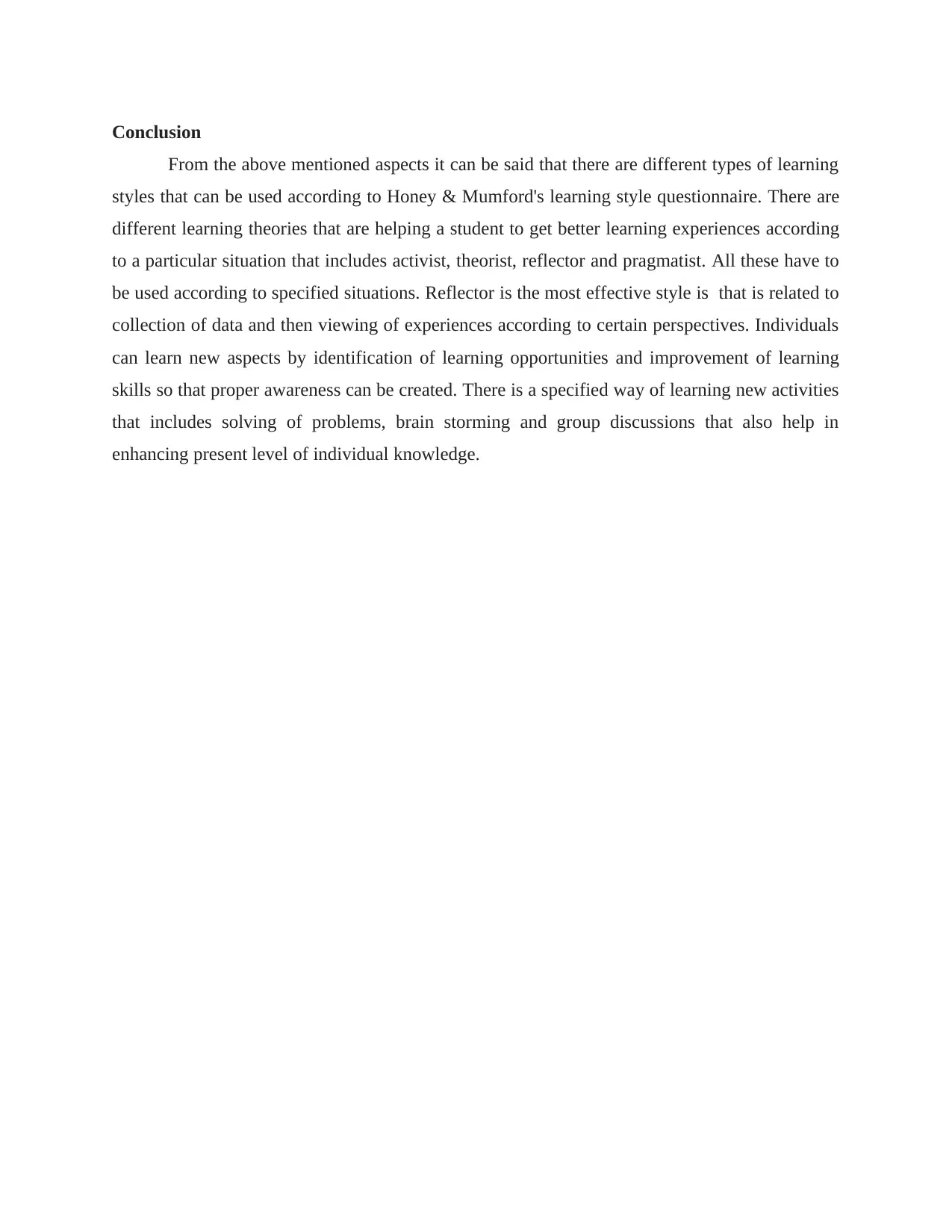
Conclusion
From the above mentioned aspects it can be said that there are different types of learning
styles that can be used according to Honey & Mumford's learning style questionnaire. There are
different learning theories that are helping a student to get better learning experiences according
to a particular situation that includes activist, theorist, reflector and pragmatist. All these have to
be used according to specified situations. Reflector is the most effective style is that is related to
collection of data and then viewing of experiences according to certain perspectives. Individuals
can learn new aspects by identification of learning opportunities and improvement of learning
skills so that proper awareness can be created. There is a specified way of learning new activities
that includes solving of problems, brain storming and group discussions that also help in
enhancing present level of individual knowledge.
From the above mentioned aspects it can be said that there are different types of learning
styles that can be used according to Honey & Mumford's learning style questionnaire. There are
different learning theories that are helping a student to get better learning experiences according
to a particular situation that includes activist, theorist, reflector and pragmatist. All these have to
be used according to specified situations. Reflector is the most effective style is that is related to
collection of data and then viewing of experiences according to certain perspectives. Individuals
can learn new aspects by identification of learning opportunities and improvement of learning
skills so that proper awareness can be created. There is a specified way of learning new activities
that includes solving of problems, brain storming and group discussions that also help in
enhancing present level of individual knowledge.
⊘ This is a preview!⊘
Do you want full access?
Subscribe today to unlock all pages.

Trusted by 1+ million students worldwide
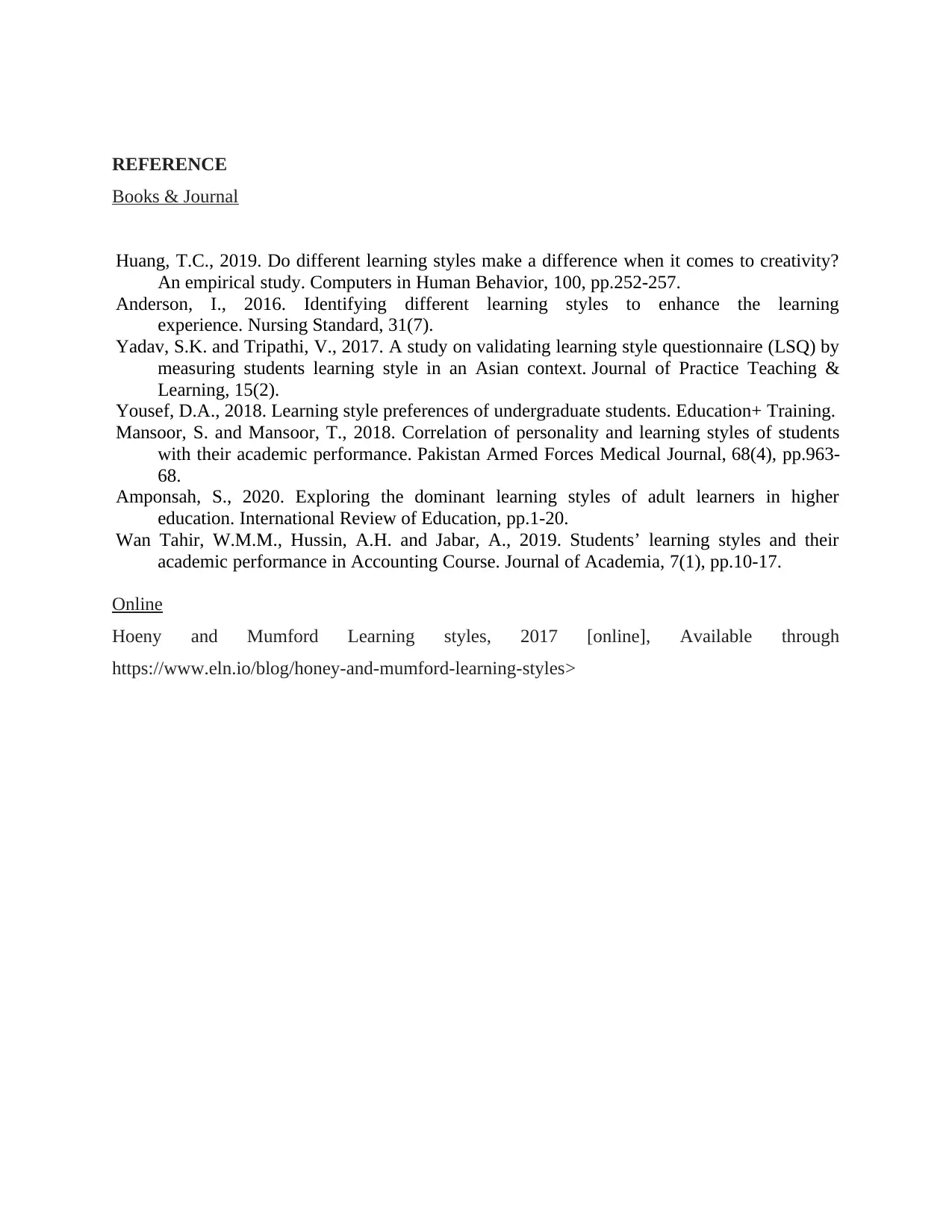
REFERENCE
Books & Journal
Huang, T.C., 2019. Do different learning styles make a difference when it comes to creativity?
An empirical study. Computers in Human Behavior, 100, pp.252-257.
Anderson, I., 2016. Identifying different learning styles to enhance the learning
experience. Nursing Standard, 31(7).
Yadav, S.K. and Tripathi, V., 2017. A study on validating learning style questionnaire (LSQ) by
measuring students learning style in an Asian context. Journal of Practice Teaching &
Learning, 15(2).
Yousef, D.A., 2018. Learning style preferences of undergraduate students. Education+ Training.
Mansoor, S. and Mansoor, T., 2018. Correlation of personality and learning styles of students
with their academic performance. Pakistan Armed Forces Medical Journal, 68(4), pp.963-
68.
Amponsah, S., 2020. Exploring the dominant learning styles of adult learners in higher
education. International Review of Education, pp.1-20.
Wan Tahir, W.M.M., Hussin, A.H. and Jabar, A., 2019. Students’ learning styles and their
academic performance in Accounting Course. Journal of Academia, 7(1), pp.10-17.
Online
Hoeny and Mumford Learning styles, 2017 [online], Available through
https://www.eln.io/blog/honey-and-mumford-learning-styles>
Books & Journal
Huang, T.C., 2019. Do different learning styles make a difference when it comes to creativity?
An empirical study. Computers in Human Behavior, 100, pp.252-257.
Anderson, I., 2016. Identifying different learning styles to enhance the learning
experience. Nursing Standard, 31(7).
Yadav, S.K. and Tripathi, V., 2017. A study on validating learning style questionnaire (LSQ) by
measuring students learning style in an Asian context. Journal of Practice Teaching &
Learning, 15(2).
Yousef, D.A., 2018. Learning style preferences of undergraduate students. Education+ Training.
Mansoor, S. and Mansoor, T., 2018. Correlation of personality and learning styles of students
with their academic performance. Pakistan Armed Forces Medical Journal, 68(4), pp.963-
68.
Amponsah, S., 2020. Exploring the dominant learning styles of adult learners in higher
education. International Review of Education, pp.1-20.
Wan Tahir, W.M.M., Hussin, A.H. and Jabar, A., 2019. Students’ learning styles and their
academic performance in Accounting Course. Journal of Academia, 7(1), pp.10-17.
Online
Hoeny and Mumford Learning styles, 2017 [online], Available through
https://www.eln.io/blog/honey-and-mumford-learning-styles>
1 out of 7
Related Documents
Your All-in-One AI-Powered Toolkit for Academic Success.
+13062052269
info@desklib.com
Available 24*7 on WhatsApp / Email
![[object Object]](/_next/static/media/star-bottom.7253800d.svg)
Unlock your academic potential
Copyright © 2020–2026 A2Z Services. All Rights Reserved. Developed and managed by ZUCOL.





